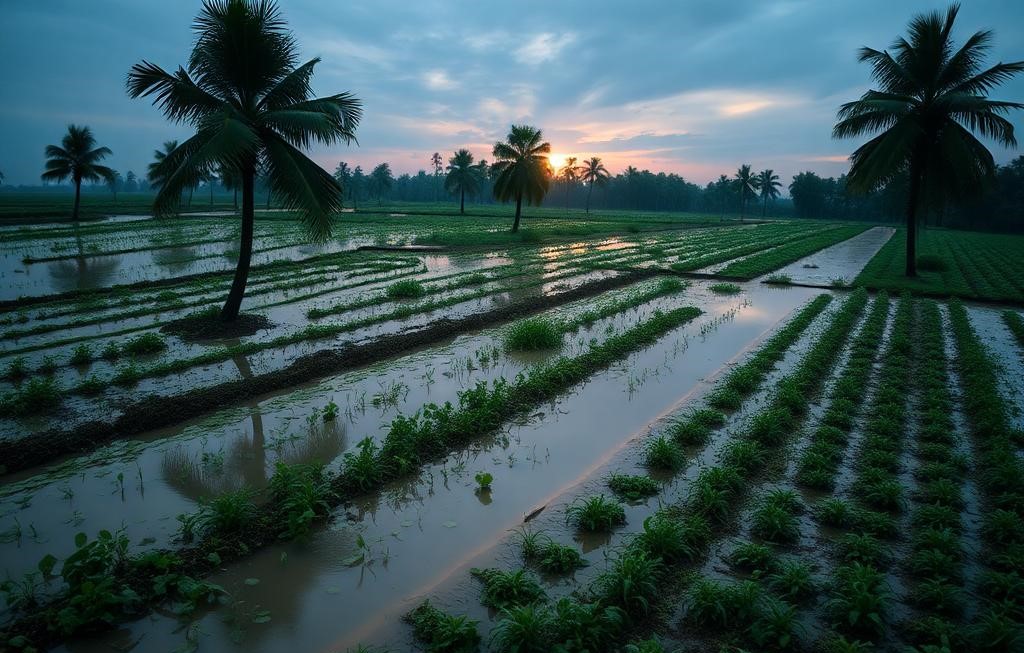Spatiotemporal analysis of scientific research to estimate agricultural damage from flooding
Keywords:
bibliometrics, HEC-RAS, flooding, MIKE 21 Flow Model FM, agricultural riskAbstract
The objective of this study was to analyze scientific articles on the estimation of agricultural damage due to flooding using bibliometric indicators, to determine crops of interest and analysis methodologies. The Scopus bibliographic database was reviewed for the period 2000-2022. The keywords used in the search were “flood damage to crops” and “flooding in crops.” A total of 236 texts were collected, mostly from Asian countries. The agricultural crops analyzed more frequently were, in Asian countries: rice (China and Bangladesh), sugarcane (India), and vegetables (Japan); in European countries: vineyards (France and Italy) and wheat (Germany and Spain); and in America: corn (USA and Mexico) and beans (Mexico). Among the simulation models, the most recurrent were HEC-RAS, MIKE 21 Flow Model FM, and satellite imagery, which combined empirical approaches (damage data collected after flooding events) and synthetic approaches (data collected through questionnaires) for data analysis. In the case of Mexico, little research was documented, representing an area of opportunity. However, it should be noted that this study only analyzed publications in English and from the Scopus database.
http://dx.doi.org/10.37114/abaagrof/2025.1
e2024-27
https://www.youtube.com/watch?v=7MagiFhofd4
References
BALTAZAR AR, Mastachi LCA, Galindo AA, Hernández TM, Becerril PR. 2021. Metodología para la estimación de perdidas económicas de cultivos de maíz siniestrados por inundaciones usando teledetección. Revista de Geografía Norte Grande. 79:207-227. http://dx.doi.org/10.4067/S0718-34022021000200207
BHAKTA SB, Kawasaki A. 2020. Quantitative assessment of flood risk with evaluation of the effectiveness of dam operation for flood control: A case of the Bago River Basin of Myanmar. International Journal of Disaster Risk Reduction. 50:101707. https://doi.org/10.1016/j.ijdrr.2020.101707
DE-MOEL H, Aerts J. 2011. Effect of uncertainty in land use, damage models and inundation depth on flood damage estimates. Natural Hazards. 58:407-425. https://doi.org/10.1007/s11069-010-9675-6
DEWAN TH. 2015. Societal impacts and vulnerability to floods in Bangladesh and Nepal. Weather and Climate Extremes. 7:36-42. https://doi.org/10.1016/j.wace.2014.11.001
DÍAZ CG. 2012. El cambio climático. Ciencia y sociedad. 37:227-240. https://intranetrepositorio.intec.edu.do/server/api/core/bitstreams/3bacdd56-e4ef-4b1f-a2eb-d5cced4f44aa/content
DUTTA D, Herath S, Musiake K. 2003. A mathematical model for flood loss estimation. Journal of Hydrology. 277:24-49. https://doi.org/10.1016/S0022-1694(03)00084-2
ESRI. 2015. Environmental Systems Research Institute: ArcGIS (Versión 10.3) Software de procesamiento digital de imágenes satelitales. Redlands, CA, USA.
http://www.esri.com/software/arcgis/ arcgis-for-desktop
FAOSTAT. 2024. Base de datos estadísticos corporativos de la Organización para la Agricultura y la Alimentación. Producción agrícola.
https://www.fao.org/faostat/es/#data/QCL
FÖRSTER S, Kuhlmann B, Lindenschmidt KE, Bronstert A. 2008. Assessing flood risk for a rural detention area. Natural Hazards and Earth System Sciences. 8:311-322. https://doi.org/10.5194/nhess-8-311-2008
JONKMAN SN, Bockarjova M, Kok M, Bernardini P. 2008. Integrated hydrodynamic and economic modelling of flood damage in the Netherlands. Ecological economics. 66:77-90. https://doi.org/10.1016/j.ecolecon.2007.12.022
LESK C, Rowhani P, Ramankutty N. 2016. Influence of extreme weather disasters on global crop production. Nature. 529:84-87. https://doi.org/10.1038/nature16467
LEIPOLD S. 2014. Creating forests with words ̶ A review of forest-related discourse studies. Forest Policy Economics. 40:12-20. https://doi.org/10.1016/j.forpol.2013.12.005
MERZ B, Kreibich H, Schwarze R, Thieken A. 2010. Review article "Assessment of economic flood damage". Natural Hazards and Earth System Sciences. 10:1697-1724. https://doi.org/10.5194/nhess-10-1697-2010
MESSNER F, Meyer V. 2006. Flood damage, vulnerability and risk perception-Challenges for flood damage research. NATO Science Series. 67:149-167.
https://doi.org/10.1007/978-1-4020-4598-1_13
MIRZA MM. 2011. Climate change, flooding in South Asia and implications. Regional Environmental Change. 11:95-107. https://doi.org/10.1007/s10113-010-0184-7
MOKHTARI F, Soltani S, Mousavi SA. 2017. Assessment of Flood Damage on Humans, Infrastructure,and Agriculture in the Ghamsar Watershed Usin HEC-FIA Software. Natural Hazards Review. 18:04017006. https://doi.org/10.1061/(ASCE)NH.1527-6996.0000248
MOLINARI D, Ballio F, Handmer J, Menoni S. 2014. On the modeling of significance for flood damage assessment. International Journal of Disaster Risk Reduction. 10:381-391. https://doi.org/10.1016/j.ijdrr.2014.10.009
MOLINARI D, Scorzini AR, Gallazzi A, Ballio F. 2019. AGRIDE-c, a conceptual model for the estimation of flood damage to crops: development and implementation. Natural Hazards and Earth System Sciences. 19:2565-2582. https://doi.org/10.5194/nhess-19-2565-2019
RAHMAN MS, Di L. 2020. A Systematic Review on Case Studies of Remote-Sensing-Based Flood Crop Loss Assessment. Agriculture. 10:131.
https://doi.org/10.3390/agriculture10040131
SANTILLÁN FA, Salinas MY, Valdez LJR, Pereira LS. 2021. Spatial-Temporal Evolution of Scientific Production about Genetically Modified Maize. Agriculture. 11:246. https://doi.org/10.3390/agriculture11030246
SCAWTHORN C, Blais N, Seligson H, Tate E, Mifflin E, Thomas W, Murphy J, Jones C. 2006. HAZUS-MH Flood Loss Estimation Methodoly. I: Overview and Flood Hazard Characterizacion. Natural Hazards Review. 2:60-71. https://doi.org/10.1061/(ASCE)1527-6988(2006)7:2(60)
SCOPUS. 2023. Base de datos bibliográfica de resúmenes y citas de artículos de revistas científicas. https://www.scopus.com
SCORZINI AR, Di-Baco M, Manella G. 2021. Regional flood risk analysis for agricultural crops: Insights from the implementation of AGRIDE-c in central Italy. International Journal of Disaster Risk Reduction. 53:101999 https://doi.org/10.1016/j.ijdrr.2020.101999
SIAP. 2023. Sistema de Información Agroalimentaria y Pesquera: cierre de la producción agrícola. https://nube.siap.gob.mx/cierreagricola/
SKAKAVAC Z, Njegomir V, Pejanovi L, Skakavac A. 2017. Risk Management of Agricultural Floods. Economics of Agriculture. 64:639-657.
https://doi.org/10.5937/ekoPolj1702639S
SWAMINATHAN MS, Rengalakshmi R. 2016. Impact of extreme weather events in Indian agriculture: Enhancing the coping capacity of farm families. Mausan. 67:1-4. https://doi.org/10.54302/mausam.v67i1.1135
TAPIA SFO, Itzerott S, Foerster S, Kuhlmann B, Kreibich H. 2011. Estimation of flood losses to agricultural crops using remote sensing. Physics and Chemistry of the Earth, Parts A/B/C. 36:253-265. https://doi.org/10.1016/j.pce.2011.03.005
VAN-DE-SANDE CJ, De-Jong SM, De-Roo AP. 2003. A segmentation and classification approach of IKONOS-2 imagery for land cover mapping to assist flood risk and flood damage assessment. International Journal of Applied Earth Observation and Geoinformation. 4:217-229. https://doi.org/10.1016/S0303-2434(03)00003-5
VEGA SBE, Domínguez MR, Posada VG. 2018. Evaluación estacional del riesgo por inundación en zonas agrícolas. Tecnología y ciencias del agua. 9:92-127.
https://doi.org/10.24850/j-tyca-2018-03-04
WARD PJ, De-Moel H, Aerts JC. 2011. How are flood risk estimates affected by the choice of return-periods? Natural Hazards and Earth System Sciences. 11:3181-3195. https://doi.org/10.5194/nhess-11-3181-2011
WOS. 2021. Web of Science: Journal Citation Reports.
https://clarivate.com/webofsciencegroup/solutions/journal-citation-reports/

Downloads
Published
Issue
Section
License
Copyright (c) 2025 Abanico Agroforestal

This work is licensed under a Creative Commons Attribution-NonCommercial 4.0 International License.


